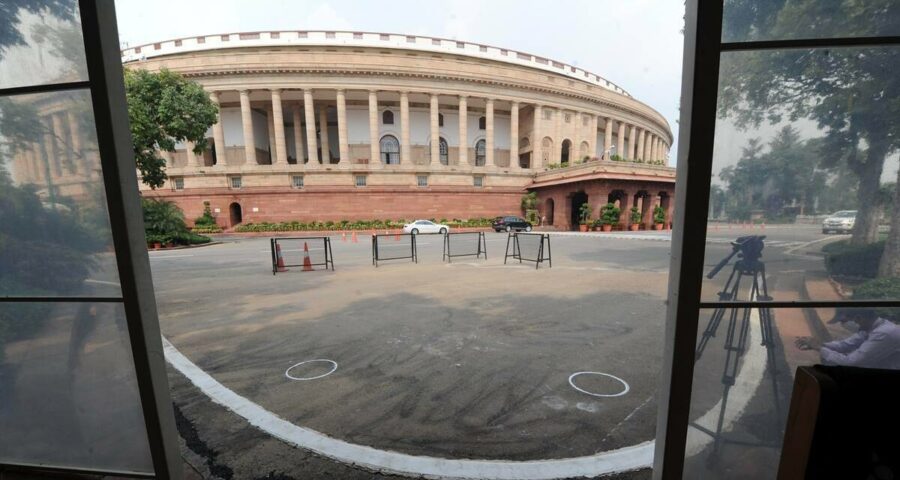How, in the name of the pandemic, can a people's representative sit in the comfort of his or her home especially when our farmers are sitting on the roads for days together? We should continue to meet, though for a shorter period
What started in Wuhan in the winter of 2019 set off a crisis across the world throughout 2020 and threatens to cast its shadow on the new year too. The COVID-19 curve in India appears reassuring, though a renewed spike cannot be ruled out given reports of the new strain. But every aspect of the nation — social, economic, cultural, educational to political — remains severely impacted. Like elsewhere, our government is working to overcome this impasse: With ordinances promulgated, several policy decisions and new pieces of legislation hurriedly passed, all efforts are towards aligning our national system to the “new normal”. Walter Lippman once said that in a democracy, the Opposition is not only tolerated as constitutional but it must be maintained because it is indispensable. In the new normal in India, the role of the Opposition is, therefore, more arduous, challenging and critical.
More so, when the pandemic has led to a marked downturn in the number of sittings of Parliament. Last year, the House met for just 33 sittings and the winter session of Parliament is conspicuous by its absence. COVID-19 was first reported in India on January 30, 2020, and it almost coincided with the budget session of Parliament, which commenced on January 31. But the session had to be adjourned sine die on March 23 after the House reassembled on March 2 post the recess from February 11. The entire budget session thus witnessed only 23 sittings with a total of 19 bills (18 in Lok Sabha and one in Rajya Sabha) introduced; 15 bills were passed by the Lok Sabha and 13 by the Rajya Sabha.
The monsoon session met for 10 sittings from September 14 to 23. Significantly, it saw drastic changes in the outlay of the List of Business of the House with not a single day being allotted for the transaction of Private Members’ Business; the starred list of questions was totally dispensed with. However, this cannot be the rule of law as it severely restricts the effective functioning of the House.
The fact that every oral answer to a starred question on the floor of the House by the minister acts as an assurance by the government makes it an important tool to hold the executive to account. In the limited time, a total of 16 government bills were introduced and 25 government bills were passed in the Lok Sabha during the monsoon session.
We cannot be blind to the second COVID-19 wave in many parts of the world. The approval for the two vaccines comes as great relief but they are no magic bullets. Faheem Younus, chief of infectious diseases at the University of Maryland, has said that it could take three years before the world is vaccinated. That COVID-19 will stay with us for a long time is undeniable.
In such a scenario, the efforts taken by the Rajya Sabha Chairman and Lok Sabha Speaker have been very encouraging. Under their leadership, suitable arrangements were made for Parliament to assemble during the monsoon session: A “shift system” was introduced for the Lok Sabha and the Rajya Sabha to meet separately, human interface was significantly reduced and all other necessary precautions were strictly adhered to.
I strongly feel — and I am sure this is echoed by my fellow legislators — that avoiding regular assembly of the House is not a solution. If we could meet under the leadership of Hon’ble Chairs of both the Houses when COVID-19 cases were soaring, we can meet now as well. How, in the name of the pandemic, can a people’s representative sit in the comfort of his or her home especially when our farmers are sitting on the roads for days together? We should continue to meet, though for a shorter period, to discuss farmers’ issues, other issues of urgent public importance and transact the essential business of the House with all the COVID-19 precautions in place.
We should remember B R Ambedkar’s opinion that the once-a-year meeting of the Central Legislature under the Government of India Act, 1935, was designed to avoid scrutiny of the government by the legislature. We should, therefore, not meet merely to fulfil the constitutional mandate under Article 85 which says “…six months shall not intervene between its last sitting in one session and the date appointed for its first sitting in the next session.” We need to work out an alternative modus operandi, somewhere between the virtual and real meeting platforms, to facilitate the full-fledged working of the House. And if the need arises, we can take recourse to “modification of Rules and Procedures” to facilitate the same.
At the same time, adjournment or reduction in the sittings of the House should, in no way, put a pause on the duties of the Opposition. The role of the committees should be reinforced: With limited members, they serve as mini-Parliaments. All preventive medical advisories can be observed while they work at full strength. If bills cannot be discussed on the floor of the House due to paucity of time, they should be referred to these committees, which can meet frequently and scrutinise them.
In the pandemic, as the country is governed by ordinances, the Opposition is entrusted with the greater responsibility of keeping a check on the executive, questioning its initiatives, being extra vigilant, guarding the purse and ensuring all-round accountability of the government. It is only a responsible Opposition that can enable the government to guide the world’s largest democracy amid all the challenges posed by the pandemic.
This article first appeared in the print edition on January 12, 2021, under the title “Let the House meet”. The writer is leader of the Congress in Lok Sabha
Source: Read Full Article


